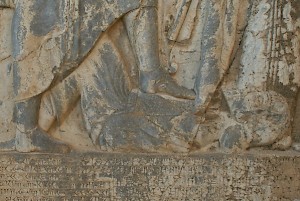Gaumata / Smerdis
Smerdis (Old Persian Bardiya): Persian prince, son of king Cyrus.

According to several ancient sources, Smerdis was the only one who was strong enough to draw a bow sent to the Persian court by an enemy; the Greek researcher Herodotus says that this enemy was the Kushite king (from Sudan), others state that it was a leader of the nomads living in Central Asia. Another Greek author, Ctesias of Cnidus, who calls this prince Tanyoxarces, says he became satrap in charge of the northeastern border.
When his brother, king Cambyses, was conquering Egypt, someone calling himself Smerdis rebelled and became sole ruler of the Achaemenid empire after Cambyses' had died of natural causes. According to the Behistun inscription, this Smerdis' rule started on 11 March 522 BCE, and this is corroborated by the dating of letters in Babylonia; on 1 July he formally became king. The new king was killed, however, by the Persian prince Darius, on 29 September in a stronghold in Media called Sikayauvati.
Darius states in the Behistun inscription that the man he had now succeeded was not the real Smerdis (who he claims was killed before Cambyses set out for Egypt) and that the rebel was a lookalike named Gaumâta. This man was a Magian and there are some indications that 'Magians' were not Persians but Medes.
For instance, Herodotus states explicitly that the Magians were a Median tribe. It is also remarkable that the new king took Sikayauvati as his residence: this stronghold has been identified with Ziwiye near Îrânshâh, a little south of Lake Urmia in the northwest of modern Iran - almost as far away from Persia as possible. From Herodotus we know that he proclaimed a three years' remission of taxes and military service to every nation within his dominion: a measure that can probably best be explained when we accept that the king felt a warm sympathy for the subject nations and cherished no particularly warm feelings about Persia.note
Although we do best never to trust ancient texts at face value, we may probably believe Darius' story that the Smerdis he killed was indeed a false Smerdis, someone who did not belong to the Achaemenid dynasty and may have been a Mede by birth. It should be stressed that Darius had the Behistun inscription engraved at a place where no human being could possibly read it; only the gods were witness to his claim that he had killed an impostor. Unless we accept the implausible hypothesis that Darius lied to his god Ahuramazda, we must believe that he spoke the truth.
Later, a Persian named Vahyazdâta proclaimed himself king, also claiming to be the real Smerdis. He seized the Persian palace (probably at Pasargadae) and was able to subdue Arachosia. But one of Darius' generals, Artavardiyâ, defeated this king on 24 May 521 BCE, after which he was forced to flee to the east. Vahyazdâta was defeated again on 14 July and crucified.